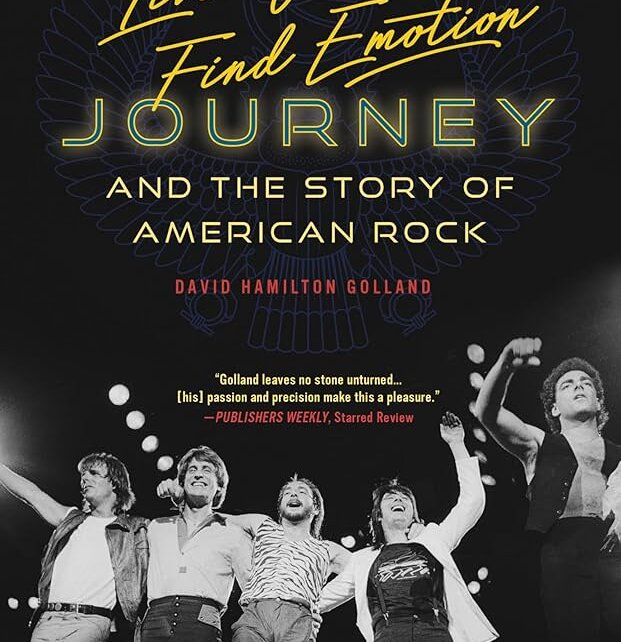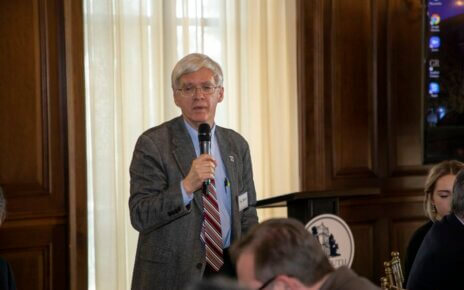David Hamilton Golland, Ph.D., Dean of the Wayne D. McMurray School of Humanities and Social Sciences and Professor of History, will have his third book “Livin’ Just to Find Emotion: Journey and the Story of American Rock” released on Tuesday, Feb. 6 by the Thunder Road Books in Spring Lake, NJ.
The book talks about Journey’s songs, what the band members were doing before Journey, the conflict between bandmates, and how, when Golland was researching for this book, he noticed elements of race dynamics between white individuals and African Americans.
Golland began, “I went back and listened to every single song and wrote a paragon for each song, and did research about Journey’s members and anything they did before Journey. The more I did the work and research, the more I couldn’t keep coming back to race; it became a race story, and it has a race thesis. You don’t need to pay attention to the thesis if you are a Journey fan. You don’t need to be a scholar to understand the book, but if you are, you will see what I am trying to argue. Rock and roll in the 1950s and 60s, white people listened to rock music, African Americans listened to soul music, and rock and roll united people to be one.”
Golland pursued this project for multiple reasons: he read a book about Journey that a journalist wrote and felt that it was a missed opportunity, the COVID-19 pandemic was at its peak, and he had much more free time on his hands.
“[The Journey book I read was] written by a journalist rather than a historian. Not that any one is worse, but [rather] a different way of looking at things. At the time, everyone was in quarantine due to the pandemic, and I asked my wife if I should try writing this book. She told me I should,” said Golland.
While Golland was writing his book, he explained that he suffered from imposter syndrome and writer’s block. Nevertheless, he stuck to a process to help him through these difficulties.
“I’m not a journalist, I wasn’t a roadie for the band, so why would anyone want to read anything I have to say? I always have to contend with writer’s block, and it can be a combination of factors that is psychological, though. Go back to your sources and think deeper about them,” he continued. “I modeled myself on Victor Hugo, who wrote ‘The Hunchback of Notre Dame.’ He would wake up early, write for hours, and be done by lunchtime. As a full-time professor, I would wake up early when I felt I was most creative, did it for hours until I felt satisfied with my work, and went to Monmouth feeling accomplished.”
Golland advised serious writers to write every day and to keep their momentum going, even if they are not working on the main project.
“Sit down and write for half an hour,” he instructed. “If you are a serious writer, you must write every day, even if it’s not about the project; keep that machine moving.”
Golland additionally explained that this book is different from his other two, which were more academically focused and took about a decade to write; he views this book as a freeing experience. While this book took less time than his other works, only about three to four years, there were some bumps along the road with the original publisher that Golland worked with.
“When I got an agent, they tried to pitch to trade presses, and they failed, which cost us about a year,” he said. “I believe the agent made a critical error in not recommending the correct chapter; it’s similar to the ‘Sopranos’ ending. The chapter they recommended was when Steve Perry, the lead singer for Journey, left the band; what is the future of Journey?”
Golland continued, “I just think it was a bad call. They aren’t a bad agent, but they should have chosen a chapter from early in the book with the lead singer of Journey.”
After Golland’s original agent didn’t work out, he was approached by an independent publishing company named Lexington Books to help him publish his book. After reviewing his work, the company didn’t think they would be the best fit for him, but they did put him in touch with an imprint of Roman and Little Field to help get his book published.
Tanya Farrell, Partner at Wunderkind PR, said, “As an independent publicist, I am working closely with Rowman & Littlefield to launch the book. Like many publishing companies, Rowman & Littlefield takes care of distribution, marketing, and sales while I focus on booking media and events and acting as a consultant on the whole campaign.”
“Dr. Golland is an absolute pleasure to work with,” she added. “He is collaborative, kind, and intelligent; the perfect author.”
Farrell explained that she believes the book will do well and that it has already received great reviews by top trades. “‘Publishers Weekly’ called it a ‘fine-grained chronicle of the rock group Journey…Golland’s passion and precision make this a pleasure,’ and ‘Library Journal’ said, ‘Readers don’t have to be Journey fans to appreciate this cerebral approach.’ We also have two events confirmed and national media, radio interviews, and podcasts in the works. It will be a wonderful launch,” said Farrell.
Golland summed up the writing process and offered some helpful words to aspiring authors: “It’s always there; it’s always lurking. Finding something within the project to keep you focused and writing on the project helps you work through it. I advise a schedule. Don’t beat yourself up if you don’t follow it because you’re only human.”




